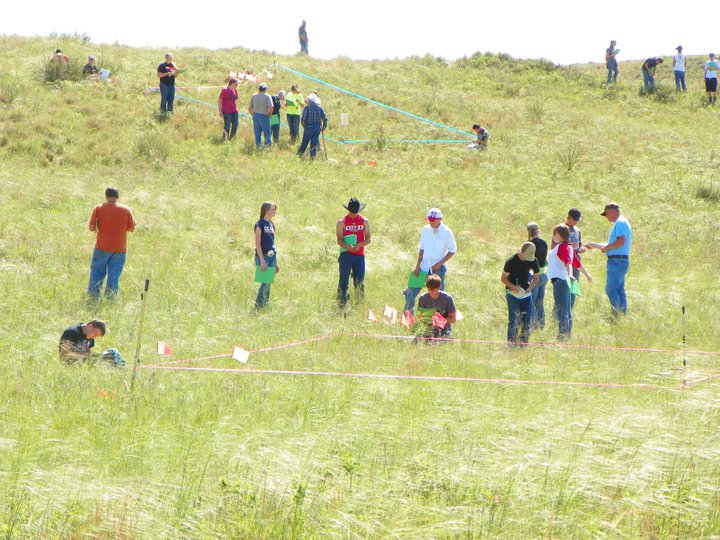
By By Karla H. Jenkins, UNL Cow/Calf, Range Management Specialist and Bethany Johnston, UNL Extension Educator
Conserving native range resources and teaching others to do the same is a long standing tradition in Nebraska. In 1954 a group of people associated with the Nebraska chapter of the Society for Range Management began what is now known as the Nebraska Range Judging Contest.
Originally, this contest was developed for adults who had an interest in range management, but it evolved into a tremendous learning opportunity for high school students and continues to encourage stewardship among Nebraska youth today. Although any interested youth or adult is welcome to participate, the most common participants are from schools that have Vocational Agriculture Programs through Future Farmers of America (FFA) or youth involved in 4-H.
Prior to their contest, students work with FFA instructors, science teachers, extension educators, 4-H leaders, and/or parents to learn to identify grasses and forbs and characteristics about them such as season of growth, life span, value to livestock, and whether it is native or introduced. Additionally, they learn how to determine the degree of use a given area of range has and how to calculate a proper stocking rate for the range.
Each September, there are six area contests held across Nebraska and then a state contest, after contestants have had a chance to try their hand at an area contest. Additionally, Old West Regional is another contest hosted by Nebraska on a rotational basis. The number of students influenced through these contests is staggering, yet encouraging, especially for those with a passion for range management. In 2013, there were 1197 high school students who competed in the six area contests. The ten year average is 1070 students and the 20 year average is 931 students. Since 2006 the area contest total has been over 1000 students; indicating an increasing interest in Nebraska’s valuable resources and their conservation. Additionally, there is an average of about 30 adults who try their hand at the contest every year as well. The state contest boasts an average of about 350-400 students.
While the Range Judging Contests are facilitated by the Nebraska chapter of the Society for Range Management, they are primarily accomplished by a partnership made up of many volunteers (about 50 for the larger contests), most of whom are employed by the Natural Resource Districts (NRD) and the Natural Resources Conservation Services (NRCS) in Nebraska, and University of Nebraska-Lincoln Extension personnel.
Hosting a successful contest is a massive undertaking. Much work has to be done before the contest, the day of the contest, and after everyone goes home. Each area contest divides up the work a little differently, but essentially, the NRD, NRCS, and UNL Extension work together to do what needs to be done. Prior to the contest, score cards for the students must be printed and delivered to the counties hosting the contest. Ribbons must be ordered for the winners. Land owners must be contacted to grant permission for the contest to be set up on their land. The plants must be flagged for the identification contest, the degree of use site has to be isolated and set up, ecological sites must be identified and prepared, and volunteers must be summoned for the big day. Students must be registered, score cards must be organized and graded; scores have to be double checked, entered in the computer, and summarized. Often arrangements are made for refreshments and an educational program for the students while the scores are tallied. Awards must be presented. Flags must be picked up, the land must be left as close to the way it was found as possible, the score room has to be cleaned, and many last minute, thankless jobs must be performed to successfully pull off a contest.
The first place junior and senior teams, and high point individuals win purple rosette ribbons while the next three placings receive corresponding ribbons. Additionally, the top 25% receive participation ribbons. Although the ribbons are a trophy the students work very hard to earn, those responsible for the contests feel the real prize is in what the students learn about range management, the legacy that is passed on, and the pride they develop in their state and the future of its resources.
Anyone interested in more information about the range judging contests should contact their local NRD, NRCS, or their local UNL Extension office. More information about Nebraska Range Judging can be found at http://www.nesrm.org/RangeJudging.html. The Range Judging Handbook and Contest Guide for Nebraska (EC-150), which explains how to range judge, are available online or at your local UNL Extension Office.